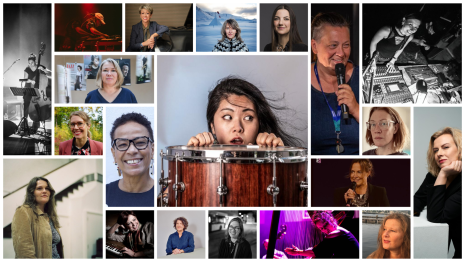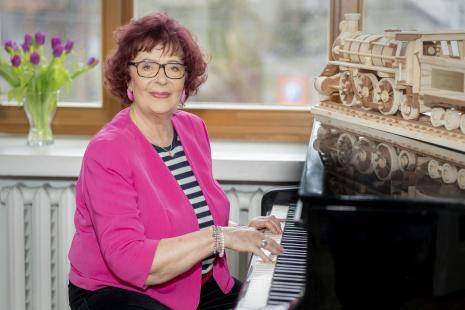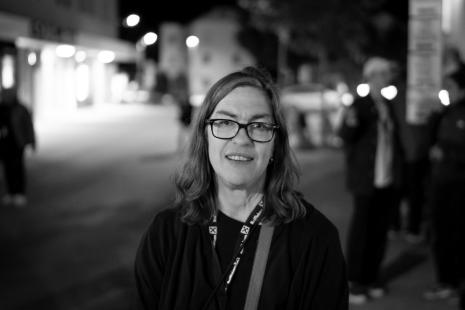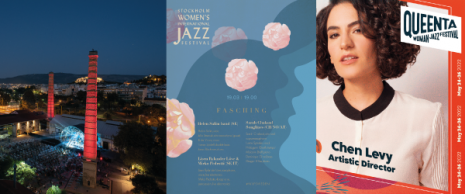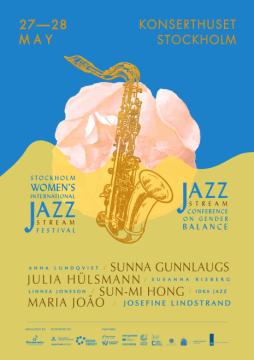#WomenToTheFore 14: Joanna Duda
We talk to Joanna Duda, a composer and artist originally from Poland, about her career and development as an artist.
How would you describe what you do?
I'm a composer, and I'm also a pianist, and I use these electronic devices - there is no proper name for that yet - but I'm creating music with electronic sounds.
What led you to the music you create today? What were your earliest experiences of music?
I grew up in Gdańsk. My parents are musicians, so it was natural that they pushed me in this direction. There was always music at home and they played in a band together for weddings and parties.
They have this huge collection of vinyl they brought from Switzerland, when Poland was a communist country. I was always listening to their collection - Quincy Jones, Michael Jackson, Motown recordings - and lots of funk and R&B stuff. I really loved it.
My mum took me to big concerts from when I was tiny. She was friends with the band Kombi, who were top of the charts in Poland for many years. We’d go to all their concerts and I spent lots of time with the son of the bass player - we were like siblings.
I grew up in this environment so it was kind of obvious that I ended up doing the same thing. It was amazing to experience these gigs. One time I went on to the stage to give the artists flowers and the bandleader lifted me up to face the crowd. It was unforgettable!
And what led you from these early experiences as a child to learning the piano and deciding to become a musician?
It wasn’t a conscious decision. Music was my comfort zone and I wanted to continue to be in this safe, comfortable space. I found the world outside music to be more brutal, things like bullying and violence in the playground.
My parents let me go to the music school in the city, which went from primary school, secondary school and on to university level. So if I didn’t feel like practising, my mum would threaten to send me to a different school, where I was thinking these kids were gonna kill me!
My parents decided I would learn piano, but it was a good decision - I like its versatility and I can’t imagine myself playing the violin! As a kid though, I really wanted to play bass guitar. This stayed with me and I bought my bass when I got my first scholarship and could put this money aside.
I stayed at the music school through to my university years. I graduated in classical music performance from the Music University in Gdańsk and then attended jazz school in Warsaw for two years when I was 25.
From this classical training, how did you find your jazz / experimental voice?
I guess it was about the limitation of my instrument. With the piano, there’s not so much that you can do after the sound is there, despite the complicated mechanism. With the guitar, when you touch the string, for example, there are so many things that you can do.
But I was also fascinated by club music and electronic sounds. I listened to Air, the French band, as a teenager and I really loved their sound. I wanted to have this palette available.
l was listening to lots of jazz funk like George Duke and Cameo. I was a huge fan of Jamiroquai. I loved that there were so many of them on stage, and everyone is part of a machine which is moving and grooving. It was totally magic for me.
My taste fluctuated as time went on. I was in love with drum and bass. And then with UK garage and then it was dubstep time. I was taking from everything and also listening to some very experimental sounds. I really had no idea how it was made, but I knew that I wanted to do something like this.
At my classical music school I was already playing by ear. I wouldn't say it was improvising exactly, but I was playing some groovy stuff. I went to my first jazz workshops when I was 23 and still studying classical music. It completely changed my life because it showed me there was different way and I couldn't see myself within the structures of classical music. I always thought that you had to be born with an innate ability to improvise, that you were chosen, I didn’t realise that you can learn it! That was a game changer.
I started to listen to more jazz and I found a lot of bands that I did like, where the message was in the improvisation. I started to believe that there was a way in for me, that I could find myself there.
I founded my first trio in the last year of university, back in Gdynia, and started to compose. Improvised music came into my life and with it the chance to be part of something else. I started to play with people and get better and better.
Is there anything else you want to say about the influences on your music and what inspires you?
I had some really great teachers, both when I studied classical music and jazz.
An unusual way that I find inspiration - and I find this really interesting - is going to a concert of a band that you’re not a fan of. Surprisingly, this can provide more inspiration than the other way around. I’ve had this happen many times, and immediately ideas come to me.
If I hear musical cliches, it makes me think, what would I do to make this music more interesting to me? How can I change it? What can I do with it? Somehow it releases a creative process in me. This is a huge thing, everyone should do this!
I’m a person that gets bored fast and I love to have lots of stimuli. I want to offer this to other people in my music, give people something new to listen to and discover.
It was a really long journey and it took me time to value myself. Being a musician is a difficult business because it takes a lot of time from the moment that you first create something to the moment that you get feedback, especially when releasing an album.
It's a lot of work and it's a lot of proving to others that it's worth listening to your music.
This takes energy and it’s important that this energy doesn’t get eaten up by the other things around you. It took me a while to realise that I really need to focus on what I like to do and to let go of the other things. I was frustrated for a long time and procrastinating my own work, or busy with other people's music. If you don’t really stick to your dreams and what you want to give people musically, you will end up playing what other people want.
So just remember, if you've got a message, you need to give it in a form that isn't filtered through others, you know?
What new projects are you working on at the moment and what's exciting you creatively?
I'm finishing my solo album and I'm excited because I still don't know how I'm going to play it and need to figure it out. I've also got some new toys that I want to check out, but first I need to finish the album. I'm still looking for a label which is a long process.
I've got some other collaborations in mind but they have to wait a bit longer. I've got one project with a bass player, we’ve got a completely unique way of improvising together, and we want to record an album, but of course we need to find some resources for that.
Who are the women - or non-binary people - you work with who inspire you the most, or that you are most excited by at the moment?
I used to listen to Meshell Ndegeocello; I really loved the connection of punk/rock sound strangely bonded with insane basslines, african flow and melo-recitative vocal lines. My favourite albums are The World Has Made Me The Man of My Dreams and Comfort Woman.
If I want to get to my comfort zone, I listen to Khruangbin. It's my favourite band now. I love their sound and the space they allow in their music; I don't know any band who does it better.
Lately I also listened to Domi & JDBeck, the duo from LA. They have an amazing spark of virtuosity, with great jazz harmonies. Their music is a new face of mainstream jazz in my opinion.
Have there been particular challenges for you as a woman artist and composer? What needs to change?
At music school I was angry when I worked out that I’d have to be ten times better than the guys. It felt so unfair. I was taking part in competitions, and sometimes it was good and sometimes it was bad, but in the end I decided this wasn’t what I wanted.
In a way, playing classical music is like you're focusing on being a sniper. It’s very demanding. When I switched, I felt that the universe was somehow supporting me and I received a lot of support from everyone around me too.
I was sometimes met with some homophobic reactions, but I could count them on one hand.
In the first couple of years of my band, the sound guys would ask me if I needed a microphone, because if there is a woman on stage, it means that she's going to sing, right? This made me angry at first, but then I just made fun out of it.
For me, it has felt like my struggle was more mostly about me, and not the world outside. I feel like I'm on one level with everyone.
What advice would you give to young people embarking on a career in creative music?
The world is changing so much it’s hard to give advice that will stay relevant for long. My advice is to see what's going on around you but don’t get sucked into all the social media and don’t decide your value is about how many followers you have.
Remember your core purpose, and keep doing it, no matter what. As long as you think it's good, you will probably get success, it just may take time.
And what advice or support did you receive that made a difference to you?
The pandemic taught me a lot. Before it, I was so busy with gigs and kind of overwhelmed. I didn't want that anymore but I didn't know how to stop. It made me realise that I can have a different life and I don't even need to be in Poland, I can be somewhere else, maybe warmer places.
Since then I have more time for myself, I take care of myself better and started to make different decisions. I started to believe that no matter what the universe is going to somehow help me, even if there is a moment when I have no gigs lined up. I’ve left behind the fear of saying no and then worrying that no one will ever call you again.
During the pandemic all the important things were happening inside of me. I had time to read books and search for meaning and develop myself as a human, not only as a musician.
Once I started to make better decisions for myself, everything else improved. I started to take care of my body, and suddenly I feel so much stronger which means I can play my instrument better. My mind is clearer and that means I am more focused.
What are your aspirations for the future, what ambitions do you still want to fulfil?
Musically, ongoing development is kind of imprinted in me. I am a person that needs to discover stuff, I'm constantly looking for something new. So I guess I will continue this work because it's still interesting. It's like there are no limits to it.
I want to work slowly and carefully and in my own way. At the moment I’m combining it with being a kitesurfing instructor, another thing I’d like to do more.
I feel like music has been there forever for me. Like, I'm somehow following this voice. It’s really integrated into my personality - it’s the same feeling I had as a kid. It’s hard to explain it, but experiencing music is a joy, you are living something together in this very moment, something with a message.
I feel like it’s a language that I’ve always understood, even before I started to talk. And it has always stayed with me. It’s one of the greatest things that can communicate with people from a stage in a completely different way to how I’m doing it now, speaking with you.
Image credits:
1 & 2 Klaudia Kruper
3. Maria Jarzyna
